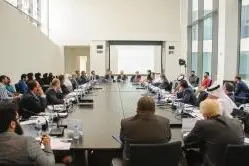PHOTO
Doha, November 15, 2015
The Qatar Faculty of Islamic Studies (QFIS), a college of Hamad bin Khalifa University (HBKU), held a CEO Roundtable on the subject of "Islamic Finance: Expectations and Reality" on Tuesday, November 10th organized by the Center for Islamic Economics and Finance--a research center at QFIS.
The roundtable was organized to encourage a constructive dialogue between academia and the leaders from the financial industry, to build an understanding of different viewpoints on crucial matters, and create a forum for discussing working collaboratively towards building a robust and stable financial industry in Qatar and beyond. The roundtable was also an opportunity to consider strategic issues confronting the Islamic finance industry today. It covered topics such as the primary objectives of Islamic banks in a market-oriented economy, the difference between perceptions of Islamic finance and the reality of the industry, and how Islamic banks can support the needs and expectations of recent graduates looking for employment opportunities.
Welcoming remarks were offered on behalf of Dr. Aisha Al Mannai, Dean of QFIS, by Dr. Muhammad Khalifa, Professor of Comparative Religions at QFIS, followed by remarks from Dr. S. Nazim Ali, Director of the Center for Islamic Economics and Finance at QFIS, and Dr. Tariqullah Khan, Professor of Islamic Finance at QFIS.
Those in attendance included Mr. Yousuf Al-Jaida, CEO of Qatar Financial Centre Authority, Mr. Hashem Al Aqeel, CEO of Investment House, Dr. Osama Al-Deraie, CEO of Bait Al-Mashura, and senior management representing the CEOs of Qatar Islamic Bank, Masraf Al Rayan, Qatar Finance and Business Academy, Ezdan Group, Doha Bank, QInvest, and Silatech. Academics from Qatar Faculty of Islamic Studies, HBKU Law School, HBKU's College of Science and Engineering, Georgetown University and Qatar University participated in the roundtable. Over a dozen students from HBKU also participated in the event, and were given the chance to network with the industry leaders and share their concerns and views.
Dr. Habib Ahmed, Professor of Islamic Finance at the University of Durham and Visiting Professor at QFIS, moderated the full-day event, which included a number of opportunities for networking between the practitioners and HBKU students.
In his welcoming remarks, Dr. Khalifa credited the dynamic leadership and patronage of Her Highness Sheikha Moza bint Nasser, Chairperson of Qatar Foundation, for the Foundation's vision of preparing the people of Qatar and the region to meet the challenges of an ever-changing world, and to make Qatar a leader in innovative education and research. He commented that, in line with this vision, the roundtable event created an opportunity for understanding and enhancing the field of Islamic economics and finance by fostering an open discussion among industry leaders and academia, while providing an opportunity for students to get more involved in Qatar's Islamic economics and finance industry.
Dr. S. Nazim Ali, the leader of this initiative, thanked the industry leaders for their participation in this event, describing the roundtable discussion as "a catalyst for a dedicated communication channel between the finance industry and academics. It is an opportunity to better understand the phenomenon called Islamic finance, and to review and discuss strategies for furthering the industry." According to Dr. Ali, "An important goal of the roundtable is to get feedback from the industry leaders on the kind of support that academics can provide to the industry."
In the knowledge-based economy, a strong linkage between research and policies and practices would ensure sustainable and inclusive economic growth in the national, regional and global economies. In furthering this mission, one of the initiatives of QFIS is in the area of promoting dialogue between the key stakeholders in Islamic economics and finance. Through its Center for Islamic Economics and Finance, QFIS has been successful in establishing national partnerships with leading institutions and continues to organize a series of public lectures, workshops and seminars that aim to further understanding of Islamic perspectives on economics and finance.
In closing, the participants of the roundtable acknowledged the need for the industry and academics to share their viewpoints with one another on a more regular basis. The Center for Islamic Economics and Finance will soon be publishing a report outlining the deliberations of the roundtable and detailing the recommendations that emanated from it.
HBKU is currently accepting applications to its Master of Science in Islamic Finance's fall 2016 intake, in addition to a variety of other programs. Those interested in postgraduate study are encouraged to visit HBKU's website to learn more about the university's offerings.
-Ends-
About Hamad bin Khalifa University
Hamad bin Khalifa University (HBKU), a member of Qatar Foundation for Education, Science and Community Development, is an emerging research university building upon unique collaborations with local and international partners. Located in Education City, HBKU seeks to provide unparalleled opportunities for scholarship, teaching, discovery, and learning for all of its students through an array of interdisciplinary programs.
HBKU's partners are Virginia Commonwealth University in Qatar, Weill Cornell Medical College in Qatar, Texas A&M University at Qatar, Carnegie Mellon University in Qatar, Georgetown University School of Foreign Service in Qatar, Northwestern University in Qatar, HEC Paris in Qatar, and UCL Qatar.
© Press Release 2015




















